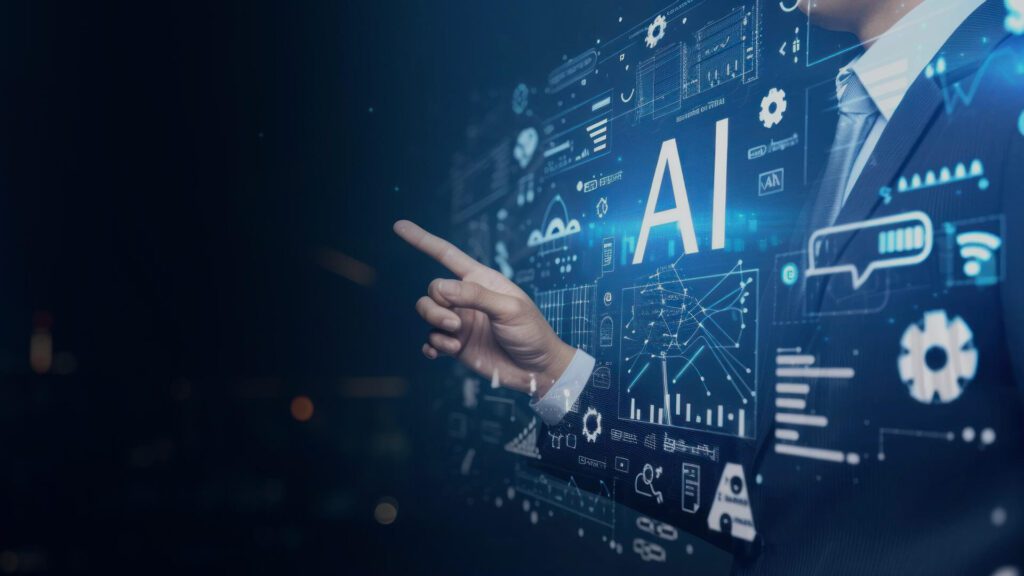- The complex connection between technology and sustainability sheds light on a paradox. While the rapid expansion of data holds the promise of a greener future, it also poses significant environmental risks.
- In this intricate balance, the role of artificial intelligence (AI) becomes pivotal in leading the way to net zero, where technology aligns seamlessly with environmental preservation.
- Unified Data Management (UDM) and AI form a symbiotic relationship, positioning themselves as the foundation for sustainable operations. Acknowledged as the cornerstone that enables businesses to harness their data for decisions aligned with sustainability goals, this collaborative synergy not only boosts organizational efficiency but also makes a positive contribution to environmental well-being.
In an era defined by unprecedented technological advancements and a burgeoning global population, our world is at a crossroads. The rapid proliferation of technology, while transformative, has also led to a surge in carbon emissions, escalating pollution, and the depletion of crucial resources. Governments and regulatory bodies are recognizing the urgency of addressing sustainability as a paramount mandate rather than a mere checkbox. As we stand at the precipice where the direct energy footprint of IT is estimated to be increasing by 9% annually, the urgency to reimagine our approach to technology and sustainability becomes ever more pressing.
In this blog, we delve into the intricate landscape where the promise of AI-driven innovation intersects with the imperative of environmental sustainability. The numbers underscore the urgency for organizations to act decisively, emphasizing the need for a shift towards sustainable practices. As we navigate the challenges and opportunities in the AI-driven era, a strategic alliance between Generation AI (Gen AI) and Unified Data Management (UDM) emerges as a transformative solution. Together, these advanced technologies and meticulous data governance pave the way for organizations to make sustainable choices and seize control of their environmental impact. Join us as we explore the synergy between Gen AI and UDM, unraveling the complexities and charting a course towards a harmonious balance between technological progress and environmental responsibility.
The Pressing Need for Sustainable Operations
With an expanding global population and the incessant surge in technological innovation, our ecological footprint has intensified, marked by heightened carbon emissions, mounting pollution, and the rapid depletion of vital resources. As our reliance on technology grows alongside the global population, the environmental implications become increasingly impossible to ignore. Governments and regulatory organizations have shifted their stance, recognizing sustainability as more than a mere checkbox but a critical mandate.
Every server humming in a data center, every smartphone pinging across the network, leaves a trail of energy consumption, resource depletion, and electronic waste. The global population is projected to reach 9.7 billion by 2050, a 30% increase from today. In tandem, global internet traffic is expected to grow a staggering 27-fold by 2025. This exponential surge in tech use translates to immense pressure on our limited resources. Data centers alone consume 2%-3% of the world’s electricity, and e-waste is now the fastest-growing waste stream on the planet. According to the MIT Technology Review, the training process for a single AI model can produce over 626,000 pounds of carbon dioxide equivalent emissions. This staggering figure is nearly five times the lifetime emissions of an average American car.
Organizations must act urgently and prioritize sustainability now. The numbers underscore the critical need to seize control for long-term success. As time passes, it will only get more challenging to move towards a sustainable future.
Navigating Sustainability Challenges and Opportunities in the AI-Driven Era
In the contemporary landscape of data-driven decision-making, organizations and governments find themselves at the intersection of a challenging paradox: how to achieve sustainability while embracing the transformative power of AI. The juxtaposition is evident; AI stands as a beacon of potential for shaping a sustainable future. It has the capacity to revolutionize our approach to environmental issues by monitoring energy grids in real-time, optimizing traffic flow in smart cities, and refining energy distribution systems. These applications hold the promise of creating a cleaner, more resilient planet.
However, within this promising horizon lies a substantial challenge — the escalating data influx driven by AI. The very actions that propel us toward innovation, such as every click, swipe, and transaction, contribute to the creation of an overwhelming 147 zettabytes of data globally in 2024 alone. This data glut not only consumes astonishing amounts of energy but also generates electronic waste and strains storage resources to their limits.
The palpable irony lies in the fact that the very tool conceived to solve environmental problems becomes a predicament in itself. As organizations strive to harness the potential of AI for sustainable practices, they are simultaneously confronted with the unintended consequences of an unprecedented data surge.
In this intricate landscape, a blend of Gen AI and Unified Data Management (UDM) emerge as the go-to solutions for achieving a harmonious balance between AI-driven innovation and environmental sustainability. Gen AI’s advanced algorithms and adaptable learning methods, combined with UDM’s strategic data management capabilities, provide a flexible and efficient approach to handling extensive data. Together, they pave the way for organizations to navigate the challenges, seize opportunities, and make sustainable choices in the complex realm of AI-driven progress.
Collaborating for Sustainability: The Synergy of Gen AI and Unified Data Management (UDM)
In meet net zero goals amid the AI-driven era, a strategic alliance between Gen AI and Unified Data Management (UDM) emerges as a robust solution, bringing together advanced technologies and meticulous data governance. Together, they form not just a collaboration but a transformative alliance, integrating advanced technology and meticulous governance to redefine sustainable practices. Let’s delve into how.
Dynamic Data Visualization and Optimization
Gen AI excels in dynamic data optimization, utilizing adaptable learning methods to discern real-time patterns and efficiently prioritize critical data. This adaptive approach enables it to create meaningful insights through advanced analytics, facilitating enhanced visualization of sustainability metrics and trends. By supporting data minimization efforts, Gen AI identifies redundant or obsolete data, ensuring that only essential information is processed and stored.
UDM, equipped with a centralized data governance framework, ensures the optimized data aligns with organizational policies and standards. By guaranteeing the accuracy and regulatory compliance of data used for visualization, it provides a reliable foundation for transparent and informative data presentations. Throughout the entire data lifecycle, UDM enforces data minimization policies, promoting efficiency in storage and processing while reducing the environmental impact associated with unnecessary data retention. It offers a structured approach for categorizing and managing data, encompassing Metadata discovery, classification, and tagging, with Context Analytics providing deeper insights into data context, considering content, structure, and data relationships.
Energy-Efficient Processing
Gen AI, inherently designed for efficiency, significantly contributes to energy savings through optimized algorithms and streamlined data processing. Its energy-efficient processing capabilities extend beyond algorithmic efficiency to encompass resource utilization, reducing the carbon footprint associated with data-intensive operations. Furthermore, it incorporates intelligent workload distribution algorithms that dynamically allocate tasks to minimize energy consumption while ensuring optimal performance.
UDM plays a pivotal role in orchestrating data workflows, minimizing the energy footprint associated with unnecessary computations. By ensuring that only relevant data undergoes processing, it promotes energy-efficient AI operations. Additionally, UDM incorporates intelligent scheduling mechanisms, optimizing resource utilization and power consumption in alignment with sustainability goals. Through collaborative efforts, Gen AI and UDM create a synergy that not only enhances energy efficiency but also establishes a model for sustainable computing practices.
Proactive Risk Mitigation
Gen AI’s predictive capabilities extend to risk identification, analyzing patterns and anomalies to forecast potential environmental and operational risks associated with data-intensive processes. By leveraging advanced analytics, it aids organizations in proactively identifying and mitigating risks, ensuring data integrity, and minimizing the impact of potential disruptions.
UDM, fortified by its governance framework, ensures that risk mitigation strategies align with organizational policies. It enables proactive measures, such as AI/ML-powered Content Analytics for the discovery and classification of sensitive data, and access controls to mitigate environmental and security risks. Enterprises gain a holistic understanding of risk exposure through descriptive and diagnostic analytics. Quick containment and isolation of sensitive data with Data Containment, enforcement of file permissions with Access Control, and rectification of permissions using Open Share Reporting contribute to a robust risk mitigation strategy. Additionally, UDM integrates Threat Intelligence Feeds that provide real-time information about emerging threats and vulnerabilities, enhancing the organization’s ability to anticipate and counteract potential risks. Through continuous monitoring and automated response mechanisms, UDM ensures a proactive stance against evolving cybersecurity threats, safeguarding both data assets and operational integrity.
Data Compliance for Regulatory Adherence
Gen AI assists in proactively identifying and addressing compliance risks through its analytics capabilities, ensuring that sustainability practices adhere to relevant regulations. Its compliance-focused analytics provide organizations with insights into regulatory adherence, minimizing legal and reputational risks associated with non-compliance. Gen AI integrates advanced anomaly detection techniques to identify potential compliance issues before they escalate.
UDM acts as a compliance guardian by enforcing data governance policies, tracking data lineage, and providing audit trails. It ensures that sustainability initiatives align with regulatory requirements, reducing legal and environmental risks. Enterprises can identify personal data files through Data Classification and Tagging, ensuring compliance with regulatory standards. Blockchain-backed Immutable Audit Logging captures data access activities for trustworthy internal governance reports, ensuring a robust compliance framework. The collaboration between Gen AI and UDM establishes a comprehensive compliance strategy, combining proactive analytics with meticulous data governance to create a resilient and legally compliant data environment.
Lifecycle Management
Gen AI’s adaptability extends across the entire data lifecycle, facilitating intelligent data placement and enabling seamless transitions between storage tiers based on data relevance and usage patterns. It actively contributes to sustainable data practices by automating lifecycle management processes, ensuring optimal data storage, and minimizing environmental impact. Gen AI incorporates automated data archiving strategies, ensuring historical data is preserved efficiently while mitigating storage costs.
UDM’s lifecycle management capabilities complement Gen AI by providing a structured approach to data handling. From data creation to archival, it ensures proper classification, retention, and disposal of data, aligning with sustainability goals and compliance requirements. Moreover, it incorporates automated archival strategies and data migration techniques to enhance efficiency in data lifecycle management. The collaborative efforts of Gen AI and UDM establish a comprehensive lifecycle management framework that not only optimizes resource usage but also ensures responsible and sustainable data stewardship.
Data Democratization for Informed Decision-Making
Gen AI democratizes data access by providing advanced analytics tools that empower a wider range of users to make informed decisions based on sustainability data. Its user-friendly interfaces and intuitive tools enable individuals across the organization to access and interpret data, fostering a culture of data-driven decision-making.
UDM ensures that democratized access aligns with security and compliance requirements, enabling a broader audience within the organization to contribute to sustainability initiatives while maintaining data integrity and security. The goal is to create a datasphere where every individual—whether a consumer, employee, or stakeholder—has the right to control their data destiny, empowering decision-makers at every level. This initiative goes beyond data accessibility; it is about empowering individuals with the knowledge to drive meaningful change. This belief is a guiding principle, ensuring that privacy and security are not features but fundamental rights woven into the fabric of our solutions. Through intuitive data visualization tools and interactive dashboards, UDM empowers users to explore and comprehend complex sustainability data sets, promoting a more inclusive approach to decision-making. Moreover, it incorporates automated data quality checks and validation mechanisms, ensuring that democratized data remains accurate, reliable, and fit for decision-making purposes. This collaborative synergy between Gen AI and UDM establishes a comprehensive framework for democratizing data responsibly and fostering a data-driven culture throughout the organization.
The Data Dynamics Advantage
Managing vast volumes of unorganized data for AI-driven opportunities in various sectors presents a significant challenge. Companies accumulate massive amounts of data, with a substantial portion—up to 80%—being unstructured. Deciding on the optimal approach to handle this data, whether through internal teams or external partnerships, profoundly impacts operational efficiency and overall profitability. While grappling with unstructured data might seem daunting, mastering this aspect gives organizations a competitive edge, setting them apart from rivals struggling with disorderly and inefficient data systems. This is where Data Dynamics excels.
Data Dynamics stands out as a premier provider of enterprise data management solutions, specializing in addressing the complexities of unstructured data through its Unified Unstructured Data Management Platform. This comprehensive platform encompasses four pivotal modules: Data Analytics, Mobility, Security, and Compliance. Trusted by more than 28 Fortune 100 organizations, the Data Dynamics Platform amalgamates automation, AI, ML, and blockchain technologies. It seamlessly adapts to handle global enterprise workloads. Collaborating with Data Dynamics enables companies to move away from disparate solutions and conflicting data perspectives. Instead, they embrace a unified software platform that not only organizes unstructured data but also unlocks invaluable insights, bolsters data security, ensures compliance and governance, and propels cloud data management initiatives.
Data Dynamics envisions a future where companies achieve data democratization, empowering users of varying technical backgrounds to swiftly access, comprehend, and derive maximum insights from expansive and unstructured data landscapes.
For further insights into how Data Dynamics can assist in organizing unstructured data and driving cost savings for your enterprise, explore our offerings at www.datadynamicsinc.com or reach out to us at solutions@datdyn.com or (713)-491-4298.






